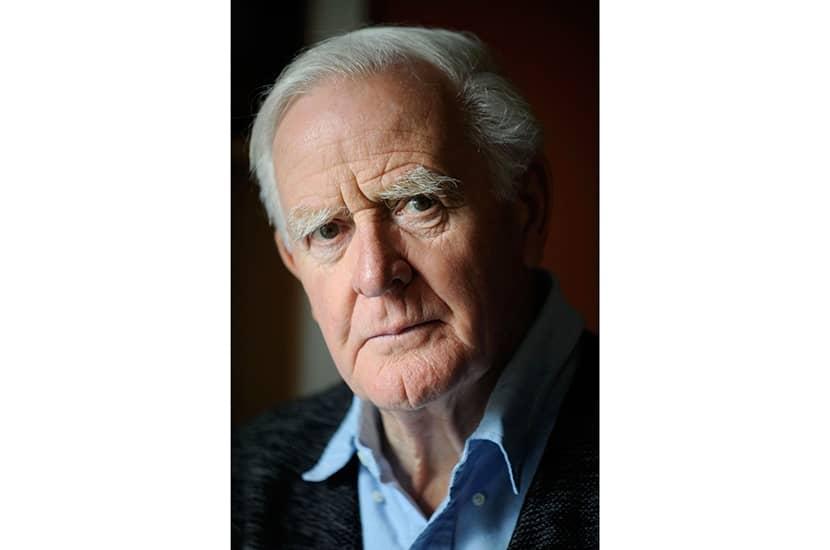Literary estates work to preserve a writer’s reputation — and sometimes milk it too. The appearance of this novel by John le Carré less than a year after his death seems almost suspiciously opportune, but whatever the publishing expediency involved, it is a very fine finale.
Julian Lawndsley is the 33-year-old owner of a bookshop in an East Anglian seaside town, having fled the City, where he has made both his fortune and his name as a canny trader. Any echoes of The Bookshop by Penelope Fitzgerald soon fade as we discover that Lawndsley knows virtually nothing about books and even less about the customers he sells them to — until Edward Avon, an exotic foreigner, enters his shop one evening.
The bookseller’s interest is initially piqued by Avon’s claim to a boyhood friendship with Lawndsley’s late father, a sex-mad vicar long ago defrocked after announcing one Sunday to a startled congregation that God does not exist. Avon himself claims to be a retired academic, with a dubious Polish father of his own. He persuades Lawndsley to let him stock a section of the shop with his favorite books, and dubs this miniature enterprise the Republic of Literature. We begin to sense that Avon is using time spent doing this as the improbable cover for another activity — like the man paid to copy the encyclopedia in Sherlock Holmes’s “The Red-Headed League.”
There are usually parallel strands to any le Carré narrative, and in Silverview a second skein features Stewart Proctor, a senior intelligence officer now in the run-up to retirement as the head of domestic security, where he investigates a damaging series of leaks. Proctor’s attention turns to Avon when he discovers that the secrets hemorrhaging are all known to Avon’s dying wife Deborah, a senior figure in the Service who has, exceptionally, been granted external access to the reports of an otherwise sealed internal network. From Proctor we learn that Avon also used to work for British Intelligence — first in his native Poland, then in Bosnia, where he was traumatized by one of the many unknown massacres of the conflict.
As Proctor starts to home in, Lawndsley’s friendship with the chameleon-like Avon grows, though it is complicated by the bookseller’s attraction to Avon’s prickly daughter, Lily. Like virtually every other character, she too has been co-opted by the intelligence services, yet proves more attached to her father than her cynical diffidence at first suggests. For the world of Silverview is cloyingly close, if rarely cozy. No fewer than three married couples in the novel have both spouses tied in some way to the Service; collectively, they form a study in organizational misery, as if all six were the sour employees of a declining, nepotistic NGO. Their glumness is at once pervasive and perverse, not unlike George Smiley’s curious deflation at the moment of his greatest triumph, when his arch-rival Karla of the KGB at last defects to the West.
Silverview is short and brisk (roughly half the length of any of the Karla trilogy) but is the better for it. There are no longueurs. As ever with le Carré, the most intriguing character is the most enigmatic, and most damaged. At the book’s end, a final twist emerges that results, surprisingly, not from the kind of conspiracy le Carré loved to concoct but from a sublimely imagined cock-up.
But then le Carré confounded our expectations in so many ways of what a ‘spy thriller’ writer provides. His books have weaknesses that would have eclipsed a lesser talent: not many of his female characters are memorable (Connie Sachs is a wonderful exception); his novels begin slowly, and some of them stay that way. He is not a writer of compelling action scenes; his love of detail is sometimes over-elaborate, to decelerating effect, and his dialogue can sometimes ring false, as if an eagerness to show rather than tell puts too much explication in his many horses’ mouths.
But for writing of subtlety, cadence and strength, with a special aptitude for the revealing particular, he is virtually unequalled. He created a cast of characters who remain vivid in our heads, and includes many minor ones — for every portrait of Smiley there is an unforgettably louche Toby Esterhase or stolid, reliable Inspector Mendel. Time and again, le Carré was able to weave an entrancing, haunting world of his own, a feat repeated in Silverview. There are few writers to match him, and fewer who are still alive.
This article was originally published in The Spectator’s UK magazine. Subscribe to the World edition here.

























